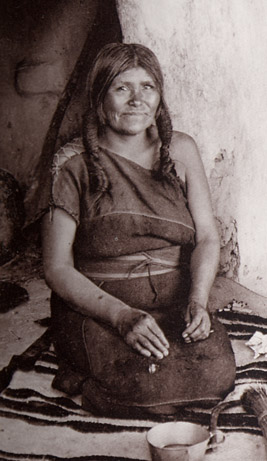The Protocol includes sections on "Intent and Benefit to the Hopi Tribe," "Risks," "Tribal Consent," "Right to Privacy, "Confidentiality," "Use of Recording Devices," "Ownership," "Fair and Appropriate Return," "Indian Preference in Employment and Training," and "Review of Product or Research Results/Study."3 Both the Resolution and the Protocol mark new ground for the Tribe in making a legal claim for Tribal control of research and use of information and materials related to the Tribe, including historic photographic collections.
It is in retrospect, now that these images have acquired the extra lenses of age, nostalgia, and layers of symbolic meaning, that we value them. However, it would be naive to too quickly reject the idea that historic photographs are not used for commercial purposes.
For example, many historical societies and museums, not to mention "for-profit" organizations across the country sell postcards and calendars using historical photographs of Indians. Also, "researchers" in archives may include, as well as academics, individuals such as Ken Burns, whose vastly popular television series make almost exclusive use of historic photographs, including many of Indians. Small wonder that the tribes would want some part, finally, in control and gain from this historic exploitation.
Therefore, repatriation of photographic materials seems unlikely and tribes such as the Hopi have concentrated on building relationships and agreements with individual institutions which hold relevant material. Several institutions in Arizona, including the Heard Museum and the Cline Library at Northern Arizona University, have informal agreements with the Hopi Tribe which restrict access to and use of photographs of sacred and ceremonial material or events, and di- rect any request for publication of images to the Hopi Tribe.


3 comments:
Writerfella here --
'Intellectual property' takes lesser precedence to 'public domain' and to 'ownership by copyright' under existing law. The establishment of 'intellectual property' also requires 'proof of auctorial generation and ownership,' that the ones claiming 'intellectual property' must the authors of the property. writerfella has encountered such matters before when he ran afoul of the so-called Native American Producers Guild back in 1993. The group, composed of Native filmmakers and film producers, was intending to claim that Native American tribes were the sole owners of historical and modern references to the cultures and existences of the various tribes, under rights ostensibly guaranteed by the Native American Freedom of Religion Act. No one, they said, may write articles, books, films, or television material about such tribes without the express permission of the tribes. writerfella lobbied for and helped defeat extensions of the act that would have been employed for such purposes. This was precipitated by his recognition that the NAPG specifically prohibited writers, even Native writers, from membership in their group unless they were filmmakers, knowing full well that films and TV cannot be accomplished without writers. Put it this way: the French lay claim to their culture and history as 'intellectual property' and that it is owned wholly and solely and completely by the French. Therefore, no one may write about the French, their country, their history, or even their language WITHOUT French permission. Legally untenable, just as if, say, the Lakota Sioux suddenly unilaterally should abrogate the treaties between their tribe and the US government. Such a thing should be unthinkable, right?
PS: ye cats, and what of the Internet?
All Best
Russ Bates
'writerfella'
This could become a new hotbed of censorship and frivolous lawsuits.
Writerfella here --
Well, yes and no. Native tribes surrendered their existences to US law when they signed their various treaties. But US law doesn't recognize treaty violation as grounds to negate the existence of such treaties. So, any and all lawsuits must be acknowledged by BOTH parties before such lawsuits can be adjudicated. All that the US government has had to say in court is that such violations did not occur. And, usually, the US government wins. Yet, there is the ongoing suit that claims the Office to the Special Trustee for American Indians for Trust Funds Management has mismanaged close to $350 billions of trust funds that simply no longer exist. Congress wants this lawsuit settled for less than $1 billion, but the Native plaintiffs have kept this lawsuit alive to this date. Stay tuned!
All Best
Russ Bates
'writerfella'
Post a Comment